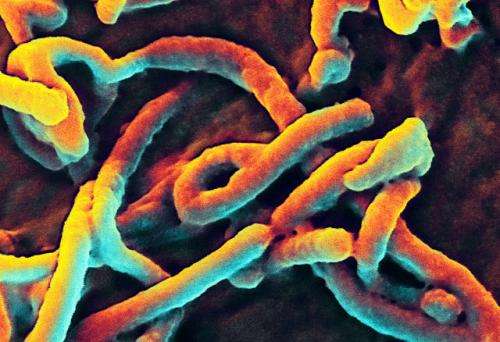Early detection key to avoiding large Ebola outbreaks

Improved diagnosis of people with severe fevers is essential in the battle against the deadly Ebola virus, a study published in the Journal of Infection in Developing Countries has found.
Researchers at Massey University and Haverford College, Pennsylvania, USA, collated and analysed epidemiological data from the 1995 Ebola outbreak in Kikwit, Democratic Republic of Congo, using a susceptible-exposed-infectious-removed (SEIR) model. This enabled the researchers to investigate how different strategies in diagnosing patients with severe fevers influences the time it takes until an outbreak is noticed.
Thomas Pfeiffer, a professor in Computational Biology and Biochemistry at Massey's Albany campus, says in resource-limited African health care systems, outbreaks can sometimes persist for weeks or even months until noticed.
"Ebola and similar viral outbreaks, such as Lassa and Marburg, are relatively rare. So unless an outbreak is known to be in progress, they're not routinely considered in the diagnosis of fevers. In malaria-endemic areas, for instance, fevers are invariably diagnosed as malaria, and alternative diagnoses are often only considered after anti-malaria medication fails. Such diagnostic delays contribute a lot to the size of dangerous viral fever outbreaks.
"By simulating epidemics on the computer, we tested diagnostic strategies that lead to a faster detection of outbreaks. Our simulations show that implementing strategies such as isolating patients that do not respond to anti-malarial and anti-bacterial therapy, doing post-mortem testing of unresolved cases, and dedicated testing of health workers who are particularly at risk are highly effective for early outbreak detection.
Professor Pfeiffer says the increased and strategic use of laboratory diagnostics would reduce the chances of dangerous viral fevers like Ebola spreading, and would also improve the quality of care for common causes of fevers and bolster the confidence in modern health care in Africa.
"The scale and severity of the current Ebola outbreak in West Africa seems overwhelming. But boosting the diagnostic resources could go a long way towards avoiding such catastrophic events in the future."
More information: "Diagnostic schemes for reducing epidemic size of african viral hemorrhagic fever outbreaks," Iruka N Okeke, Robert S Manning, Thomas Pfeiffer: www.jidc.org/index.php/journal … e/view/25212079/1149
















